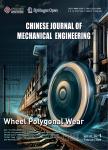Delay-dependent H_(2)/H_(∞) Control for Vehicle Magneto-rheological Semi-active Suspension
Delay-dependent H_(2)/H_(∞) Control for Vehicle Magneto-rheological Semi-active Suspension作者机构:School of Mechanical and Automotive EngineeringHefei University of TechnologyHefei 230009China
出 版 物:《Chinese Journal of Mechanical Engineering》 (中国机械工程学报(英文版))
年 卷 期:2011年第24卷第6期
页 面:1028-1034页
核心收录:
学科分类:082304[工学-载运工具运用工程] 08[工学] 080204[工学-车辆工程] 0802[工学-机械工程] 0823[工学-交通运输工程]
基 金:supported by National Natural Science Foundation of China (Grant No. 51075112 Grant No. 51175135)
主 题:magneto-rheological semi-active suspension(MSAS) time-delay, delay-dependent H2/H∞ state feedback control linear matrix inequality(LMI)
摘 要:The exist researches of the magneto-rheological semi-active suspension(MSAS) control mainly focus on the design of control laws,which aim at obtaining an optimal control strategy to improve the ride comfort and handling *** the controller design,the stability of the MSAS system cannot be confirmed owing to the control input time delay considered *** this paper,a quarter vehicle MSAS model with time-delay is ***,through formulating the sprung mass acceleration suitably as the optimization object,suspension deflection and tyre dynamic load and coulomb damping force as the constraint objects,with considering the control input time-delay,a delay-dependent state feedback H2/H∞ controller is *** to Lyapunov-Krasovskii functional theory,the sufficient conditions for asymptotic stability and the existence of delay-dependent H2/H∞ controller are obtained,and the controller design is transformed into the minimization problem for linear function through linear matrix inequality(LMI).Random road excitation simulations and experiments are carried *** simulation and experiment results show that the design can preserve the closed-loop stability and achieve the performances for MSAS system in spite of the existence of the control input *** present study can provide an important basis and method for research on time-delay problem in MSAS and other chassis subsystems.



